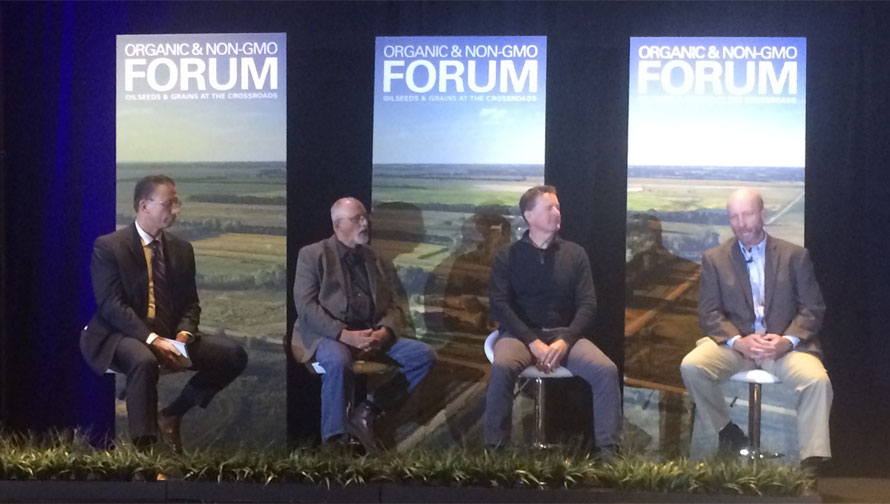Work on soil health first
“You need to get producers to work on soil health first. It will protect their farms through the transition,” said Kent Solberg, livestock & grazing specialist for the Sustainable Farming Association. This involves practices such as planting cover crops, diverse crop rotations and not using synthetic fertilizers, he said.
Tim Raile, owner of Raile Farms in St. Francis, Kansas found it rewarding to learn about the biology of the soil.
“You need the right ingredients to get balance in the soil,” Raile said. “With conventional farming adding NPK (nitrogen, phosphorous, and potassium) was the focus. Now those things are in the soil.”
Raile had previously grown genetically modified crops but realized that “GMO crops and herbicides weren’t sustainable.”
Dave Bishop, owner of PrairiErth Farm in Atlanta, Illinois, said transitioning to organic is an investment that takes time.
“You need to give the land time to metabolize the change. You have to start with understanding the system. Have a long-term goal.”
The farmers also emphasized that transitioning farmers need to have a different mindset for organic than they did in conventional farming.
“(The change) is between the ears,” Bishop said. “If conventional corn sold for $6 per bushel and soybeans $12 would you transition to organic? You have to do this for the right reason. If it’s economics, I don’t think you will last.”
He emphasized that farmers who just practice input substitution by replacing organic inputs instead of conventional ones “will have trouble.”
“You have to have the mindset and think long-term for your family and community,” Solberg said. “You have to think: is my soil ready for this?”
“There is a difference between farming organically and being an organic farmer,” said John Mesko, executive director at Midwest Organic and Sustainable Education Service (MOSES). “It ties into family life and how you’re seen as a farmer.”
Importance of livestock; many educational resources available
Having livestock is also important to a successful transition to organic.
“Grazing livestock helps soil microbes, and soil health is driven by microbial activity. Livestock are a powerful tool for moving a farm to soil health,” Solberg said.
“You need a combination of what animals do and what plants do for the system to work,” Bishop said. “Animals are a critical part of a system to be regenerative.”
Solberg recommends that farmers not try to transition their whole farm at once.
“Start small, transition a small piece of land; this helps minimize risk and makes the learning curve less steep.”
There are many educational resources available to help transitioning farmers.
“For someone wanting to transition, there is a lot of information out there,” Solberg said. “The internet has created a huge volume of information. It’s also good to go to conferences and field days.”
Bishop emphasized the human connection.
“Get to know other farmers doing this, find mentors. Go to seminars and talk to as many farmers as you can to understand what you are getting into.”
Mesko says the transitional farmers will find support among established organic farmers.
“The organic farming community is very welcoming. There is a real warmth and camaraderie.”
Passing on to next generation
Another benefit of organic farming is that it appeals to younger people.
“It creates opportunities for bringing the next generation in, bringing young folks back to the farms, and it helps build community. It’s a symbiotic relationship,” Solberg said.
“A lot of farmers are considering transition for the next generation, to create a viable business to pass on to the next generation,” Bishop said. “I see tremendous change at the helm of agriculture in the next 10 years.”
With the growing consumer demand for organic foods, there is a need for more organic farmers.
“We need successful farmers, people who are committed,” Mesko said.





